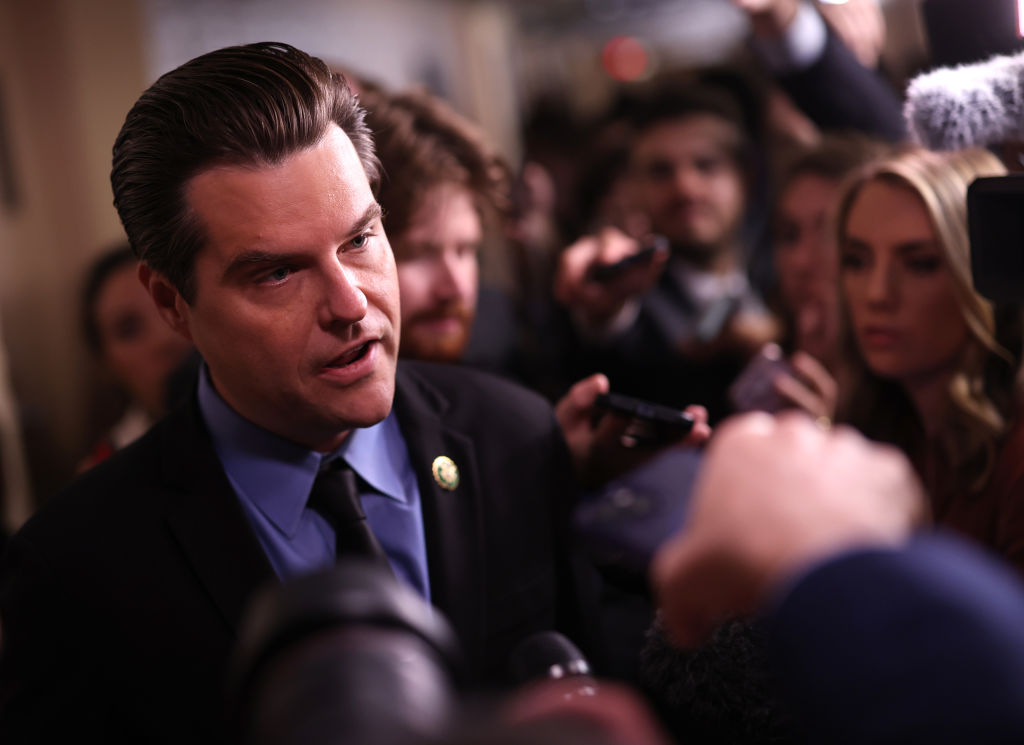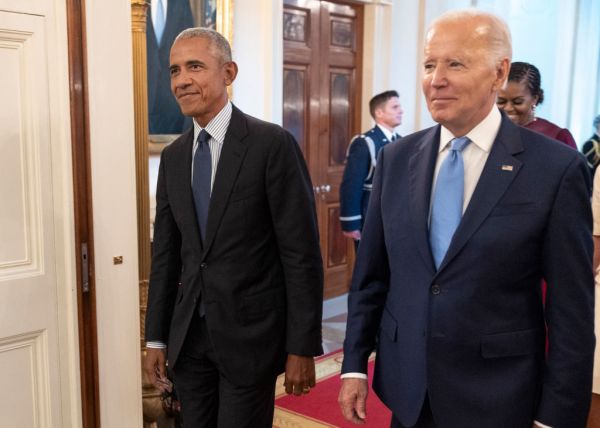Rep. Mike Lawler, contemplating how a handful of his fellow Republicans are about to shut down the federal government and saddle him and the rest of the party with the blame, is almost speechless. As he prepares for the weekly GOP conference meeting on Tuesday morning at the Capitol, Lawler searches for the words to describe his colleagues holding up party unity in the House for what they claim is a desire for necessary cuts to discretionary spending.
“Circus performers?” he tells The Dispatch, seemingly resigned to more chaos.
Performative politics is what the GOP rank-and-file have come to expect from their most strident colleagues these days. With a shutdown looming and Kevin McCarthy’s speakership potentially on the table, House Republicans are grappling with many of the same forces that have plagued their narrow majority all year: unresolved fiscal politics, skewed incentives for attention-seeking, murky policy goals, and margins thin enough that a few truculent members can grind proceedings to a halt.
The current situation is following a now-familiar pattern. Over the weekend, representatives of the moderate Main Street Caucus and the conservative populist Freedom Caucus, tacitly deputized by party leadership, had crafted an imperfect but workable proposal. It would temporarily fund the government, achieve some spending cuts, and avoid the toxic politics of a shutdown. With a House Republican majority of just four seats, McCarthy can hardly afford to lose any of his members. But the proposed resolution had been pronounced practically dead on arrival by the most obstinate members of the Freedom Caucus. Those holdouts make up probably less than half of the 40 or so members of the group, but they are led in this particular crusade by the inveterate Rep. Matt Gaetz of Florida.
“I think it’s bad for the country, it continues the inflationary spending, the waste, the failure, and the election interference of Jack Smith,” Gaetz told The Dispatch Tuesday morning. “I’m also not for continuing the Ukraine policies negotiated between Nancy Pelosi and Mitch McConnell. So it’s nothing personal. I just don’t like this bill. I guess they can call me whatever they want, but right now, they’d probably have to call me effective if I get the votes.”
Other members of the GOP conference are trying to be diplomatic in their criticism of Gaetz and his crew. “Everybody has a set of principles and they usually try to operate by them and I applaud that. On the other hand, this is still a case for, to get something done, you have to move as a team,” says Rep. Tom Cole of Oklahoma. “We don’t have a lot of margin for error here.”
Rep. Patrick McHenry of North Carolina, an ally of leadership, treads carefully when talking about the intransigent few. “They’re a part of our …” McHenry says, pausing before deciding to change course. “In order to move conservative policy, we need them to participate. We’ll work in the majority that we have, and we’re trying to do the best policy we can with the majority we have.”
But Lawler doesn’t hold back in the same way: The frustration pours out of him. “I mean, it’s a joke. It’s a joke,” the New York Republican says. “We have a crisis at our border. And these people want to vote against a measure that would actually do something to help secure our border and stop this massive influx. Shutting down the government is not an option. It doesn’t work. Those who do it lose. And at the end of the day, you know, they are the ones that are looking to bring this country down, and it needs to stop. We have an opportunity to govern. The American people gave us that opportunity. And we have a responsibility to do that. And so you know, it’s really, you know, on their doorstep if they choose not to do that.”
Lawler is the most willing to vocalize the exasperation with the holdouts shared by many in the House Republican conference. He hails from a district Joe Biden won by more than 20 points in 2020, and any signal to voters that Republicans can’t govern is bad news for him and the 17 other GOP members from Biden-won districts.
But it’s Rep. Byron Donalds, one of the two Freedom Caucus members who negotiated the proposal in question, who is trying hardest to conceal his anger at his fellow right-wingers. He and Rep. Scott Perry, the chairman of the Freedom Caucus, had what few in their wing of the conference have had: a seat at the table. For a group that has been defined by its opposition—to multiple Republican speakers, to raising the debt ceiling, to funding resolutions—many of its members were now looking at this as a chance to achieve something.
“You know, I started as a conservative activist, I started in the Tea Party movement. And if you had told me back in 2013, 2015, 2017, 2019, that you’re going to cut the federal agencies 8 percent, we would have all said ‘Really? Do that.’ And that’s what we’re doing in our bill and I believe we have broad support,” Donalds says following the Tuesday conference meeting.
He says he doesn’t want to get into labeling his Freedom Caucus friends who rejected his hard work out of hand. “I think that everybody wants to do the best that they can for this country, putting this country first, making sure that we are battling and doing everything possible to end the insane policies and spending in our government,” he says.
But, asks The Dispatch, are Gaetz and his compatriots even acting in good faith? “We’ll see,” Donalds says, his annoyance starting to bubble to the surface as he recounts the pitch he made to the holdouts a few minutes earlier. “I think, you know, and what happened in the room was, we basically said, if anybody wants to go upstairs and work on more stuff, let’s do it. And I stood up and I was very clear: ‘Anybody that wants to work, if you’re a no, and you want to work on something better, let’s do that. If it means we have to work through spending bills, let’s do that.’”
Gaetz, on the other hand, doesn’t sound like he wants to work with Donalds, McCarthy, or anyone on anything. “I’m not voting for a continuing resolution. I thought the era of continuing resolutions was over when Kevin McCarthy became speaker,” he says. “I’m a big fan of Byron Donalds. He’s my friend, and I think he’s terribly misguided. I think he’s one of the most effective members we have in this conference. And frankly, I just think we need to get our best players back onside so we can run winning plays.”
That’s a not-so-subtle condemnation of Donalds, Perry, and the other Freedom Caucusers willing to sign on to a good, not great, deal to cut spending, fund the government, and keep the House Republican conference intact to fight another day: They’re on the wrong side, but I’m on the right side.
It’s an almost identical dynamic that has driven the action throughout the current Congress, from McCarthy’s drawn-out election as speaker to the brinkmanship over raising the debt limit a few months ago. Not all Freedom Caucus members are created equal, and McCarthy has been successful at bringing along those whose priority is moving the conference rightward on spending. It’s revealed these members as having, buried underneath layers of “true conservative” garb, something of a pragmatic streak.
The holdouts—the circus performers, the intransigents, those who Rep. Don Bacon of Nebraska says would “vote against the Bible because there’s not enough Jesus in it”—well, what are they looking for? Lawler has an idea.
“They’re not principled. Because it’s never about policy. I mean, you got one guy right there down the hallway,” Lawler says, gesturing toward Gaetz, who is surrounded by TV cameras and reporters and lights just a few feet away. “It’s all personal.”









Please note that we at The Dispatch hold ourselves, our work, and our commenters to a higher standard than other places on the internet. We welcome comments that foster genuine debate or discussion—including comments critical of us or our work—but responses that include ad hominem attacks on fellow Dispatch members or are intended to stoke fear and anger may be moderated.